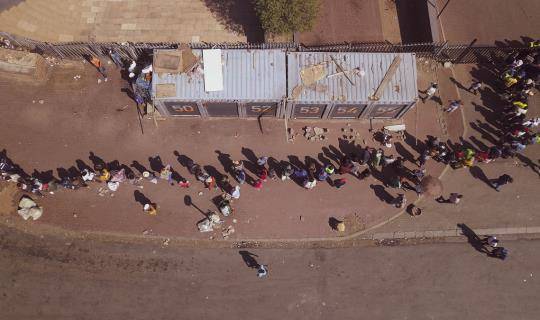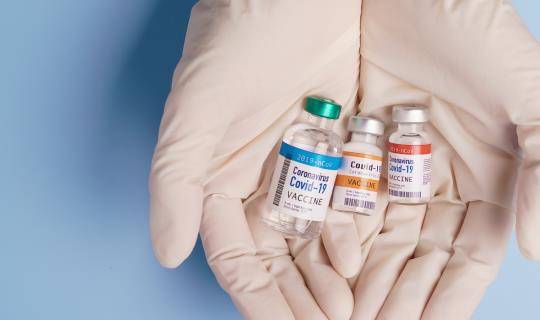State of play: COVID-19 vaccine procurement and distribution in emerging economies
By World Courier
This article is a follow-up to the discussion: "Are you ready for the last mile? COVID-19 vaccine procurement and distribution in emerging economies."
The COVID pandemic and its impact has been with us for nearly two years now, and over 270 million cases have been confirmed1. Eight billion doses have been administered globally2; however, the pandemic is far from over. New variants are raising alarms, and vaccine equity threatens global protection from this deadly virus.
"There may be plenty of vaccines available, but uptake of the vaccine has not been equal."


Dr. Ryan has called for European authorities to "close the gap" in vaccinations. The WHO and other members of the COVAX coalition have long been promoting the importance of the equitable global distribution of coronavirus vaccines. COVAX itself has worked to procure millions of doses and distribute them to middle and low-income countries. However, among the wealthier nations, the message of vaccine equity has largely been disregarded. 56% of the world's population has now received at least one dose of a vaccine3. But in low-income countries, that figure is disproportionally low, currently standing at just 7.2%4.
In June 2021, leaders at the G7 summit committed to sending one billion vaccine doses to countries in need. However, that is not enough to secure global protection from COVID-19.

Getting vaccines to countries in need is critical, as is distribution within those countries. Last-mile logistics have proved to be a significant challenge, there are reports of logistical issues resulting in precious vaccine doses expiring and being destroyed before they make it into people's arms.
In July 2021, we invited experts from the WHO, the Africa Medical Supplies Platform (AMSP), and the Brazilian Society of Infectious Disease (SBI) to discuss these challenges and strategies for addressing them.
"As low-income nations gear up to receive and distribute these doses, it is important to understand what works, and why." Jaqueline Escotero, Regional Vice President for Latin America at World Courier, said in her introduction to the panel discussion: "Are you ready for the last mile? COVID-19 vaccine procurement and distribution in emerging economies."

Addressing many challenges at once

Getting vaccine doses to their initial destination in good condition is just the first step. The receiving country then needs the internal infrastructure to continue to support the cold supply chain.
Maricel Castro is a Technical Officer for the WHO's Expanded Program on Immunization and is currently assisting countries worldwide with COVID-19 vaccine readiness. She says the COVAX partners seek to evaluate each country's preparedness and fill in gaps in equipment and planning before approving them to receive doses through the program.

While it's possible to anticipate some of the things a country will need to store and distribute vaccine doses effectively, Castro emphasized that it's also essential to find out what's happening on the ground. "We are experiencing challenges in terms of collecting feedback from countries, information to understand what is the real situation, what's really happening there, what kind of problems they encounter."
Castro also said better data is needed on vaccine utilization so that it's clear when a country cannot use doses by their expiry date; this would make it possible for COVAX to intervene and help redistribute doses: "It's quite difficult to collect this information right now," Castro said. "But we are improving as we develop tools to support countries in reporting their utilization in a more timely manner."
Public information is also critical, said panelists: "Here in Lagos, Nigeria, a lot of people are skeptical about getting vaccinated," said Uchenna Chidi-Anene, Client Relations Manager for the Africa Medical Supplies Platform.
Currently, just 3.7% of the population in Nigeria is partly vaccinated.
"There are so many theories and schools of thought here," Chidi-Anene added. "Some people think other substances are being injected into them...I'm not seeing a government that is trying to sensitize the people, trying to encourage people to go and get vaccinated."
Similar levels of vaccine hesitancy don't exist in Brazil, where some 77% of the population has received at least one dose. However, vaccination efforts In Brazil have faced setbacks resulting from misinformation or confused messaging, said Dr. Rosana Richtmann, Director of the Immunization Committee of the SBI.
"In the morning, we would tell the population that the vaccine is good, the vaccine is safe... on the other side, the politicians would always question the safety of vaccines, the necessity of vaccines."
What is the global outlook for COVID-19?
"Unfortunately, I agree with the majority of people," said Dr. Ritchmann, who explained that she would be more optimistic if the expiration dates on vaccines got extended, which would aid distribution efforts. Every dose counts, even if we cannot stop the virus completely. "The donations from the upper-income economies are very important to help countries mitigate another wave of the pandemic."
The key, she explained, is to maximize the limited supply available by ensuring that proper planning is in place to ensure nothing goes to waste.
Regarding whether the infrastructure is in place to ensure effective vaccine distribution, Chidi-Anene agreed, "... in the cities, yes, they have adequate infrastructure," she said, "but when you go into the interior and rural communities, there's little or no infrastructure, especially for cold chain equipment."
Ritchmann countered that low-income countries have previously responded well to public health emergencies. "Planning, collaboration, and communication need to be heavily focused on to overcome those potential shortfalls of infrastructure," she urged.
COVAX is working to improve its resources for low-income countries to fill those gaps. In some cases, Castro said that governments have also successfully worked with third parties to coordinate and execute vaccine distribution. Ultimately, she said, everyone needs to learn from past mistakes and adapt for the future, "we are all learning."
Planning is crucial, said Escotero of World Courier. This includes time and temperature requirements, security measures, quality management, storage solutions, ideal travel routes, and contingency plans.


World Courier has supported the distribution of COVID-19 vaccines to more than 30 countries worldwide, including distributing millions of donated vaccines to Armenia, Kosovo, Ukraine, and South Korea. Leveraging our global network and innovative packaging solutions, we have supported last mile deliveries worldwide, from areas with limited cold chain infrastructure to remote islands only accessible by boat and even Antarctica.
We have what it takes to keep shipments moving, even in the most challenging of circumstances, from the AIDS crisis to the Icelandic volcano, the Ebola outbreak, and the COVID-19 pandemic. We protect our partners by anticipating challenges and planning for the future.


Case study
Last minute shipments across Africa
As of December 2021, Africa is the least vaccinated continent. In many African countries, the share of the population who have received at least one coronavirus shot is below 10%. And while wealthier countries have ordered a steady supply of vaccine doses directly from manufacturers, the availability of vaccines for lower-income countries can be unpredictable, making planning more difficult.
Earlier this year, the South African government decided not to use one million doses, as they were concerned that the vaccine was not effective against a strain of the virus. World Courier was tasked with redistributing the doses to 14 African countries. Time was of the essence, as they were due to expire in just six weeks, so quick thinking, planning, and distribution were necessary.
1, 2, 3 ,4 Source: Our World in Data




.jpg?h=320&iar=0&w=540&useCustomFunctions=1¢erCrop=1&hash=FFAD46B50DC7BAF96943931DC619FE9D)